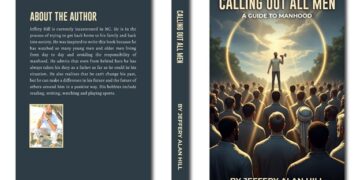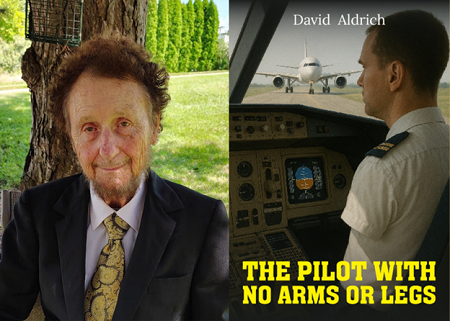David Aldrich’s novel, The Pilot With No Arms Or Legs Goes To War, doesn’t ask for sympathy. It demands respect. The book walks readers through the reality of living in a body that no longer obeys, yet still finding a way to live with pride. It isn’t just about physical limits, it’s about the deeper human hunger for dignity, control, and meaning, even when the world sees only weakness.
How Dignity Survives When Control Is Lost
One of the most powerful things about this novel is how it redefines dignity. The main character loses control of his body, but not of his mind, not of his will. There’s a difference between being powerless and being defeated, Aldrich makes that line clear. Every scene reminds readers that dignity doesn’t come from perfection or strength. It comes from choosing to keep your head high when the world expects you to bow.
The character’s quiet confidence feels earned, not written. He doesn’t ask for admiration; he commands it simply by living truthfully. It’s in how he faces daily tasks with calm precision, how he keeps his humour alive. Through him, the book teaches that dignity is not granted, it’s maintained, one choice at a time.
Why Pride Can Be The Most Honest Form Of Survival
There’s a kind of pride that builds walls, but there’s another that builds endurance. Aldrich’s story captures the second kind. The main character’s pride isn’t arrogance; it’s a refusal to be pitied. He insists on doing what he can, even when it takes twice the effort. That quiet pride becomes a way of saying, “I’m still here.”
Readers sense how familiar that feeling is, that inner voice that rises when you’re tired of being helped, tired of being defined by what you lack. Pride, in this story, becomes an act of survival. It’s what keeps the spirit upright when the body won’t cooperate.
How Routine Becomes A Form Of Discipline And Strength
The novel shows how the smallest routines become lifelines. Waking up, getting dressed, learning to adapt, these are not just habits, they’re acts of strength. The main character treats them with a soldier’s focus. Every morning, every effort is a victory over despair. The discipline that once shaped him before the war becomes the very thing that sustains him after it.
Readers begin to realise how much courage hides in routine. When life changes drastically, routine becomes order. It gives shape to chaos. Aldrich uses these moments, simple, repetitive, human, to show that structure is often what saves us when everything else falls apart.
When Pain Turns Into A Quiet Kind Of Wisdom
Pain is constant in the story, but it doesn’t dominate. It transforms. Through hardship, the main character learns to listen, to observe, to see what most people overlook. His pain becomes a strange kind of teacher, shaping a deeper understanding of patience and perspective.
Aldrich never paints him as a saint. He’s frustrated, angry, sometimes silent for days. But those flaws make the wisdom more believable. Readers can feel how pain doesn’t purify him, it matures him. It turns ordinary thoughts into insights. And in that honesty lies the book’s greatest power: it makes suffering human, not tragic.
The Unseen Power Of Gratitude In Daily Life
The novel carries a soft undercurrent of gratitude. It isn’t loud, but it’s there in every page. The main character notices things differently, a warm breeze, a kind word, the steady presence of someone who refuses to give up on him. These moments don’t fix his life, but they fill it.
Aldrich writes gratitude as a kind of awakening. It’s not about ignoring pain but recognising joy in spite of it. Readers feel that balance, that strange coexistence of struggle and thankfulness that defines what it means to live well after loss. Gratitude here is not polite; it’s survival in disguise.
How True Strength Is Measured By Stillness, Not Motion
The story challenges the idea that strength always moves forward. Sometimes, strength simply sits still and refuses to collapse. The main character becomes a living symbol of this truth. He may not walk or fly, but his presence carries weight. His strength doesn’t need to be seen to be real.
Readers find something deeply moving in that. It forces them to rethink their own definition of courage. Maybe it isn’t about doing more, but about continuing to be when doing more is no longer possible. That quiet endurance, that calm defiance, becomes the heart of the novel.
Why Stories About Dignity Change The Way We See Humanity
By the time the story ends, the reader’s understanding of dignity has changed. The Pilot With No Arms Or Legs Goes To War isn’t just about one man’s body; it’s about everyone who’s ever been underestimated. It teaches that dignity is not measured by ability but by attitude, not by achievement but by presence.
This story leaves a mark because it doesn’t try to make readers feel sorry, it makes them feel proud. Proud of how fragile humans can be, and how powerful they remain anyway. It’s the kind of story that lingers quietly, reminding you that even when life strips away everything you thought defined you, your worth stays untouched.
Ending: Living With Grace In A World That Tests It
When the last page closes, the feeling it leaves is steady, almost sacred. The book doesn’t celebrate victory; it celebrates grace. Grace in routine, in pride, in patience. The Pilot With No Arms Or Legs Goes To War ends with quiet dignity, the kind that can’t be taken away because it was never built on what could be lost.
Aldrich’s writing reminds readers that the body can be broken, but the human spirit doesn’t bend easily. Dignity, once claimed, can outlast pain, pity, and time itself. That truth, simple, stubborn, and beautiful, is what makes this novel unforgettable.





























